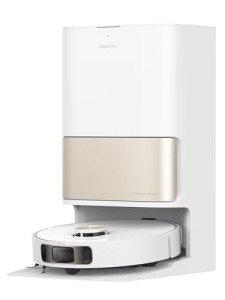Robotic Vacuum Cleaner Comparison: The Future of Home Cleaning
In current years, robotic vacuum have actually changed the method we preserve cleanliness in our homes. With advancements in innovation and the incorporation of synthetic intelligence, these devices have evolved from simple novelty items to important household devices. This post supplies a comprehensive comparison of a few of the leading robotic vacuum on the marketplace, helping consumers make informed decisions when picking a design that matches their needs.
Understanding Robotic Vacuum Cleaners
Robotic vacuum are self-governing machines designed to clean floorings immediately. Geared up with sensing units, they navigate around challenges and adjust their cleaning routes for maximum effectiveness. The essential features that distinguish different models include suction power, battery life, app connectivity, navigation innovation, and price.
Secret Features to Consider
When comparing robotic vacuum, possible purchasers must consider the following factors:
- Suction Power: Measured in Pascals (Pa), suction power identifies the effectiveness of getting dirt and particles.
- Battery Life: The length of time a vacuum can run before requiring a recharge significantly affects its cleaning efficiency.
- Navigation Technology: Models might utilize easy random navigation or innovative mapping innovations (like LIDAR) that enable them to produce a map of the home.
- Smart Features: Connectivity to mobile phone apps or smart home systems can enhance usability and control.
- Filter Type: HEPA filters are suggested for allergic reaction victims, as they trap irritants and improve air quality.
Comparison of Top Robotic Vacuum Cleaners
Below is a comparison table of some of the best robotic vacuum available in 2023:
| Model | Suction Power (Pa) | Battery Life (min) | Navigation Technology | Smart Features | Price (GBP) |
|---|---|---|---|---|---|
| iRobot Roomba i7+ | 1700 | 75 | Smart mapping | App control, voice command | ₤ 949 |
| Roborock S7 | 2500 | 180 | LIDAR | App control, multi-floor | ₤ 649 |
| Neato D7 | 2000 | 120 | LIDAR | App control, zone cleaning | ₤ 599 |
| Ecovacs Deebot T10 | 3000 | 150 | Smart mapping | App control, space detection | ₤ 799 |
| Shark IQ Robot | 1200 | 90 | Random | App control, self-emptying | ₤ 399 |
Description of the Table
- iRobot Roomba i7+: Known for its robust cleaning capability, it features smart mapping technology that allows it to designate specific locations for cleaning. Its self-emptying feature is a plus for convenience.
- Roborock S7: This design stands out in suction power and battery life, making it perfect for larger homes. Its LIDAR technology helps develop an efficient cleaning path, and it can vacuum and mop at the same time.
- Neato D7: The D-shape style permits much better corner cleaning, and it features strong suction power. Its LIDAR navigation allows it to map out cleaning areas properly.
- Ecovacs Deebot T10: Boasting the highest suction power and advanced navigation, this design can deal with multiple floorings efficiently. It's a versatile option for families with differing floor types.
- Shark IQ Robot: An economical option that still uses smart features. Its self-emptying capability and app combination make it a useful option for those searching for a solid cleaning companion without breaking the bank.
Advantages of Robotic Vacuum Cleaners
Robotic vacuum cleaners use various benefits that add to their increasing popularity amongst consumers:
- Time-Saving: Automated cleaning enables users to release up valuable time that can be invested on other activities.
- Convenience: Many designs can be set up via apps to clean at specific times, lowering manual effort.
- Availability: They can reach under furnishings and in tight areas where standard vacuums may have a hard time.
- Daily Maintenance: Regular use of robotic vacuums can assist preserve a regularly tidy environment, promoting much better total home hygiene.
Frequently Asked Questions About Robotic Vacuum Cleaners
1. How typically should I run my robotic vacuum?
It is recommended to run the robotic vacuum at least 2-3 times a week to keep cleanliness, though everyday use can be helpful, particularly in homes with animals or high foot traffic.
2. Do robotic vacuums work on carpets?
Yes, lots of robotic vacuums are developed to work on carpets, but efficiency may vary based upon the design's suction power and brush type. Look for designs specifically discussed as effective for carpets.
3. best floor vacuum robot ?
Most robotic vacuums can efficiently choose up pet hair, however those with strong suction and tangle-free brush designs are especially appropriate for this job.
4. How do I maintain my robotic vacuum?
Regular maintenance includes cleaning the brushes and sensors, emptying the dustbin, and occasionally replacing filters to guarantee optimal efficiency.
5. Are robotic vacuums worth the investment?
While they tend to be more pricey than traditional vacuums, the benefit, effectiveness, and time-saving elements make them a worthy financial investment for lots of families.
The market for robotic vacuum cleaners continues to broaden as innovation progresses, providing customers a variety of choices to suit various cleaning needs and budgets. By carefully thinking about functions such as suction power, battery life, and smart capabilities, users can choose a design that lines up with their way of life. Whether for benefit, ease of use, or superior cleaning efficiency, robotic vacuums are unquestionably improving the future of home cleaning.

